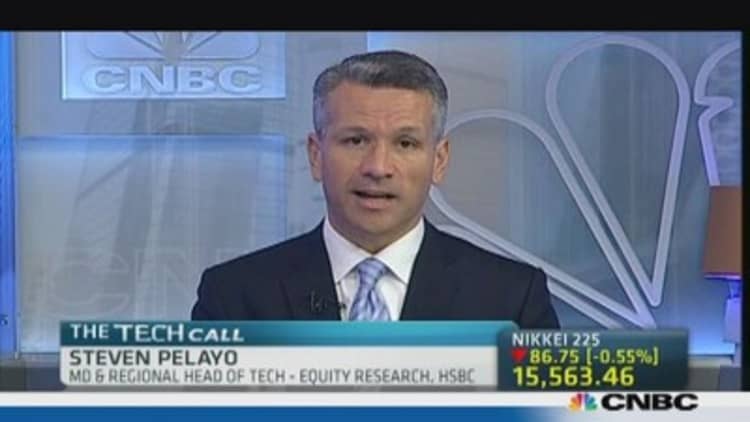The year end is shaping up to be anticlimactic for major chip foundry Taiwan Semiconductor Manufacturing Company (TSMC), yet analysts remain bullish.
According to data released Tuesday, TSMC recorded sales of NT$44.33 billion ($1.49 billion) in November, down from NT$51.79 billion in October. TSMC estimates a decline of about 10 percent on quarter in the fourth quarter sales, but Chairman and CEO Morris Chang says it's not a sign of things to come.
"We're very optimistic [that] next year will be a double-digit growth year, the whole year.
Now if the first quarter comes in a bit low, you will have a surge in the second and third quarter that will rattle our teeth."
(Read more: )
Steven Pelayo, managing director & regional head of technology at HSBC, agrees.
"Seasonally, we're going through a bit of a downturn. We also have a bit of excess chip inventories out there so these excess inventories do need to be purged. That's why in the months of October and November, we're going to keep seeing these monthly declines. This should set up for a nice inventory restocking and seasonal recovery in the first half of next year."

But it's not just the cyclical or seasonal advantage that semiconductor manufacturers have to look forward to – Pelayo expects that the expansion of China's 4G LTE network and the slated deal between China Mobile and Apple will increase demand for semiconductor chips.
"China Mobile alone has more than 750 million subscribers, that's two USA's. Of that subscriber base only about 20 to 23 per cent are even on 3G. So China is still a fair bit behind what we see in the developed markets on 4G and LTE. Getting that 3G ramp-up happening for the rest of China is still a very big opportunity for chip companies."
IHS expects one of the major themes for mobile devices will be the continued proliferation of Over-The-Top (OTT) broadband content – which transfers media on top of a data connection, often separating the content provider from the data or service provider.
(Read more: Apple signs long-awaited deal with China Mobile: Report)
According to an IHS report, shipments of OTT-capable devices are expected to rise 20 percent next year from $1.7 billion in 2013. But this ramp-up will put a strain on chip makers due to weighty technical requirements imposed by OTT media.
But with challenge also comes opportunity. In October, Apple's iPhone 5 became the first top-tier smartphone to house an ultra-fast A7 chip with 64-bit support. 64-bit processors could well become the new norm for top-tier smartphones next year, and this isn't the only innovation HSBC expects to hit mass production.
"We also expect a more significant shift towards new semiconductor technology such as 3D/TSV (through silicon vias) packages, 3D NAND and 20nm/14nm. Samsung and TSMC are likely the companies which are best prepared to benefit, in our view."
TSMC is still HSBC's favored pick over Samsung Electronics when it comes to semiconductors though. With TMSC likely to be the main beneficiary of Apple's endeavor to diversify its supply chain away from Samsung, the company is slated to be a major manufacturer of Apple's new 20 nanometer A8 processor, which will appear in new iDevices.
(Read more: )
"We actually upgraded [TSMC] about a month, a month and a half ago and we see a cyclical inflection point. The worse the 4th quarter is, that's the more the inventories are purging, the greater the restocking that is going to happen in the first half of next year. Most importantly, TSMC is going to be gaining market share from Samsung they will be building the core chip for the next apple iPhone. We think this can contribute another 8-10 per cent in revenue for TSMC next year."
George Chang, head of Upstream Technology Research at Yuanta Research is also bullish on the potential of TSMC describing it as "one generation ahead of its competitors".
)"We expect the biggest contribution will come in 2015 – that's the time when all Apple products will start using TSMC chips."

